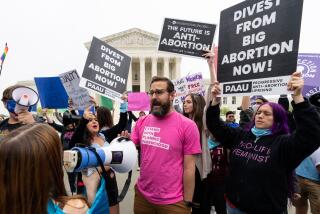High court’s refusal to hear Oklahoma appeal is blow to abortion foes
- Share via
WASHINGTON — The legal push in some Republican-controlled states to restrict abortion rights suffered a setback Monday when the U.S. Supreme Court declined to hear Oklahoma’s appeal seeking to reinstate a law that effectively banned the use of abortion-inducing drugs.
The court’s decision delivered a surprise victory for abortion rights groups and was seen as a sign that while conservative justices may be open to giving states new powers to restrict abortion, they are not ready to impose sweeping new limits that would significantly interfere with women’s constitutionally protected rights.
It was only Round One in a new Supreme Court term that could see at least two other key cases on abortion rights, including a Texas law that also restricts the use of abortion-inducing drugs and requires doctors who perform abortions to have admitting privileges at nearby hospitals. The court on Monday took up an emergency appeal related to that law, which opponents say will force a third of Texas’ abortion clinics to stop offering the procedure.
The other key case involves Arizona, which is appealing the U.S. 9th Circuit Court of Appeals’ injunction against a law that limits abortions to within 20 weeks of pregnancy, instead of the 24 weeks commonly accepted for a viable fetus under Roe vs. Wade.
Since 2010, a dozen states have passed new laws that would restrict abortion without banning it. They are designed to test whether today’s more conservative court, and particularly Justice Anthony M. Kennedy, are ready to pull back from Roe vs. Wade and the right to legal abortion.
More than 20 years ago, Kennedy cast a key fifth vote to preserve Roe vs. Wade, but he also made clear he would uphold some restrictions, agreeing in 2007 to uphold the ban on “partial birth” abortions because, he wrote, the government has “legitimate interests in regulating the medical profession in order to promote respect for life, including the life of the unborn.”
In June, the court signaled a willingness to define such regulations when it agreed to hear the Oklahoma case, following a ruling by that state’s Supreme Court that the law was unconstitutional because it would have restricted the use of several abortion-inducing drugs, including preventing doctors from “off-label” use of mifepristone, also known as RU-486 or the abortion pill. But the justices apparently changed their minds last week after the state high court, in response to an inquiry from the justices, said the 2011 law, as written, would “effectively ban all medication abortions.”
The state defended the law by saying it only wanted doctors to follow the exact protocols set by the federal Food and Drug Administration in using the two commonly prescribed abortion drugs, misoprostol and mifepristone. But opponents noted that misoprostol had not been formally approved for that use by the FDA and that doctors in recent years found lower dosages of mifepristone were safer than those currently approved by the FDA.
Abortion rights groups praised the court for rejecting what they said was a veiled attempt to restrict abortion under the guise of promoting women’s health or upholding medical standards.
“We hope that the court’s decision in that case indicates they see the real agenda behind the laws that politicians in many states are pushing,” said Julie Rikelman, litigation director at the Center for Reproductive Rights. “Politicians claimed it was about protecting women’s health, but the Supreme Court saw right through that. These laws are just about restricting access and hurting women.”
Justices issued a one-line order saying the Oklahoma petition was “dismissed as improvidently granted.”
Monday’s action means the Oklahoma Supreme Court’s December 2012 ruling is final.
The disputed Texas law will have a more sweeping impact. It was mostly cleared to take effect last week by the U.S. 5th Circuit Court of Appeals in New Orleans. One key provision requires abortion providers to have a physician on staff who has admitting privileges at a hospital within 30 miles of the clinic.
Four other states tried to enforce similar laws this year but were blocked by courts.
The law was designed “to weed out quack doctors,” said Kyleen Wright, president of Texans for Life Coalition. “It’s offensive to say this has nothing do with patient care.”
Lawyers for Planned Parenthood, the American Civil Liberties Union and the Center for Reproductive Rights filed an emergency appeal with Justice Antonin Scalia on Monday, urging him or the full court to put the Texas law on hold until its constitutionality can be decided.
The groups estimated 20,000 women a year would be denied abortions if the measure were upheld. They explained that hospitals, fearing harassment and picketing, are reluctant to give admitting privileges to a doctor who performs abortions. Moreover, because abortion is a “low risk procedure,” these doctors rarely send a patient to a hospital, they said, and in an emergency, these patients would be admitted regardless of the doctor’s privileges.
Early last week, a federal judge in Austin cited these reasons in blocking portions of the state law. But a three-judge appeals court in New Orleans disagreed and said the law would not seriously inconvenience pregnant women.
“For residents of the Rio Grande Valley, it is undisputed that physicians with reporting privileges would be available in Corpus Christi … and the distance from Rio Grande Valley for Corpus Christi is less than 150 miles,” Judge Priscilla Owen for the 5th Circuit Court said.
Scalia, who oversees emergency appeals from the 5th Circuit, gave the Texas state lawyers eight days to file their response to the emergency appeal. Usually, responses are called for within a few days.
“We are certainly disappointed he gave a deadline that was so far out, given the emergency situation and the havoc this is causing in the interim,” said Brigitte Amiri, an ACLU lawyer.
Texas officials insisted there was ample evidence that the admitting privileges requirement protected women’s health.
“We believe the 5th Circuit panel’s unanimous decision was correct and will continue to defend the law before the U.S. Supreme Court,” Lauren Bean, a spokeswoman for Texas Atty. Gen. Greg Abbott’s office, said Monday in a statement.
molly.hennessy-fiske@latimes.com
More to Read
Sign up for Essential California
The most important California stories and recommendations in your inbox every morning.
You may occasionally receive promotional content from the Los Angeles Times.












